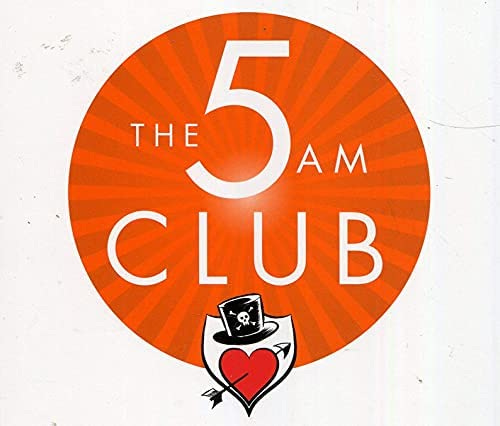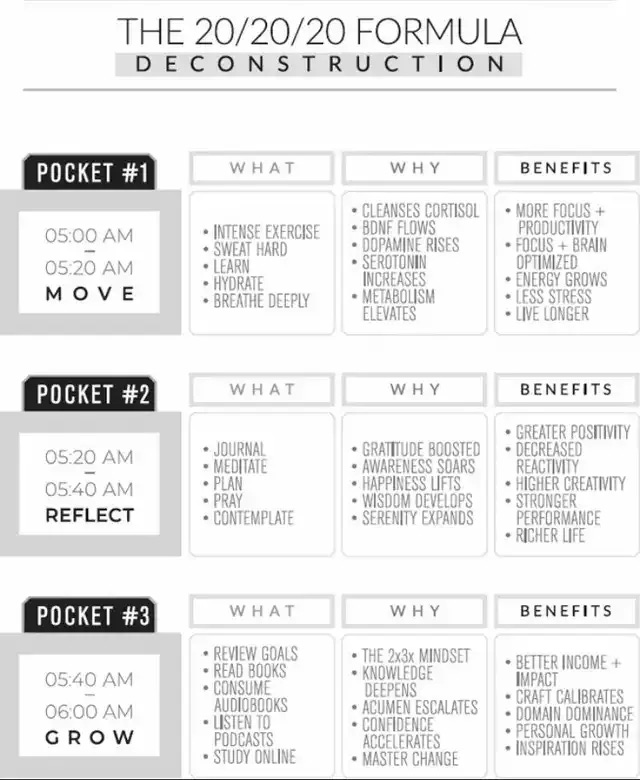Ever since 2014, the year I graduated college, I have associated myself as a morning person. It was quite the 180 from what I was at Penn State - I remember even getting up for an 11:15 am class on Tuesdays to be a struggle. During this change (which was forced upon me by corporate America), I realized I was mentally sharper in the morning and tried to use it as an advantage, whether completing a mentally taxing task first thing or hitting an early morning run here in NYC. However, my mornings needed more structure. Considering I am pivoting to strategy consulting, a field that prides itself on a structured way of thinking, I felt I should research what top performers do to create ordinance in their morning routines.
I recently finished Robin Sharma's 5 am Club and felt compelled to share some of the findings. The book's repeated ad nauseam mantra is "own your morning, elevate your life." It overviews how the most successful people start their days to create impactful results. There are quite a few frameworks in the book, but the one that stands out that epitomizes the central theme is the 20/20/20 method, which I have pasted below:
To outline the three things successful people do in their mornings, Sharma breaks these out into move, reflect, and grow, also explained as physical, mental, and professional growth.
Pocket #1 - Move
Many of the most successful entrepreneurs in the world use their uninterrupted morning time for a quick workout to stay in shape. The logic is that the more the day becomes, the more of a chance of a distraction or not wanting to go. There are also scientific reasons outlined below that show objectively why a morning workout is beneficial.
In the 5 am club, Sharma describes an alchemy that develops after a quick yet intense workout. The key is ensuring you sweat, so HIIT workouts are best (rather than just a walk). When you wake up in the morning, your cortisol levels, aka your fear hormone, are at their highest. Keeping this high is proven to stunt your ability to think and achieve results optimally. Vigorous exercise naturally lowers cortisol and increases serotonin, the hormone that regulates happiness, and dopamine, which governs drive and positivity. A good morning workout also releases BDNF, or brain-derived neurotropic factor, which helps repair brain cells damaged by stress and help grow new ones. It's no surprise that there is a correlation between solid cognitive ability and being in good physical shape.
I am a massive fan of my Peloton rides (shout out to a fellow Bruce die-hard and my favorite instructor, Jenn Sherman) or a long run on the West Side Highway. After doing some digging (and being on a student budget), Apple Fitness offers a generous free trial (3 months free with most new Apple purchases), as well as most credit card companies who reimburse you for your Peloton monthly subscription (Chase) or Equinox+ app (Amex). Even better, it's fantastic to see tech employers offer a monthly "wellness" stipend to spend this on. No need to belabor this point, as most people I know reading this already have their routine - but best to do this first thing in the morning for the reasons above.
Pocket #2 - Reflect
You can break down the second pillar of the 5 am Club into two parts: meditation and journaling.
Tim Ferriss has been an idol of mine for a while. For those who don't know who he is, he is the author of many best-selling professional development books, such as the Four-Hour Workweek. He also has been a podcast pioneer, having a successful podcast called the Tim Ferriss Show, where he interviews some of the most successful business titans such as Marc Andreesen and Tony Robbins. In his interview with Ray Dalio, I was fascinated to hear that Ray's biggest secret, which enabled his financial success, was his daily meditation routine. Even more fascinating, Tim mentioned that roughly 90% of the people he interviews (and he only interviews top performers in different fields) swear by meditation or another form of "morning mindfulness" as one of their hidden secrets to make them successful. This strong correlation was enough of a trend to pique my interest.
I have always thought of meditation as a little "woo-woo." However, after doing some reading and science behind the benefits, it might have a branding problem. Current research shows that mindful meditation helps lower your levels of cortisol and, thus, your levels of stress. Tim describes it as a "warm bath for your brain," which I sometimes need as a type-A ESTJ. I now have it a goal of mine to meditate moving forward, and most have recommended Headspace (for beginners) and Calm (for intermediate and above). Glad that one of these is commonly paid for by an employer and also offers a crazy student discount (which I will be using) for only ~$10 a year.
Something new that came out of the "grow" pillar was that many have a gratitude journal where they can put pen to paper. The process is to write down the tasks that would make the day successful, write down your ambitions, and reflect on what is good in your life. One thing that stood out was the quote, "the quickest way out of hard emotions is to have the wisdom and courage to go straight into them." I have never done or thought of journaling, but I recently purchased the Five Minute Journal as, after some research, it looks to be the most widely used and structured.
Journaling and meditation are two things I will be adding to my morning routine moving forward.
Pocket #3 - Grow
Professional development was the third pillar of the 20/20/20 method. This one is self-explanatory, and in today's podcast and audiobook culture, most are doing it already. This purpose is to deepen your intellectual capacity, improve your current expertise, and outlearn those you compete against.
I have always found it helpful and intellectually stimulating to hear from leaders I aspire to be 20 years from now who help share their learnings and failures along the way. And if I have learned one thing, it is that failure is the best path to success. A common theme in the book is that those who have done the most have failed the most. We as humans are hard-wired to want to grow and not stay complacent. Most people aren't lazy; they are not involved in things (both personally and professionally) that excite them. It is clear that when people see more success, they work more rather than less - which is why I believe the growth pillar is the most important.
Some of my favorite podcasts I am listening to now (in a bit of a Startup GTM vibe right now):
Tim Ferriss Show - interviews world-class performers from eclectic areas (investing, chess, sports)
Grit - interviews executives at high-growth ventures
20VC - interviews the world's most incredible VCs on different trends they see in the startup ecosystem, and they reflect on past successes/failure
Operators - interviews non-founder/VC/CEO operators in the startup community
I realized these are specialized. Moving forward, I'll want to diversify. I would love to hear what you all are listening to on podcasts and audiobooks.
Quick sweat, give your mind a warm bath, and listen to a podcast. That is the structure I will use moving forward in my morning routine. I'm excited to implement these next week and get ahead of the wave of resolutions in a month.
I'd love to hear more of the morning routines that have helped give you an edge!





Love this so much!! Sometimes I struggle to fit it in but I think it makes all the difference 🧘♀️✏️